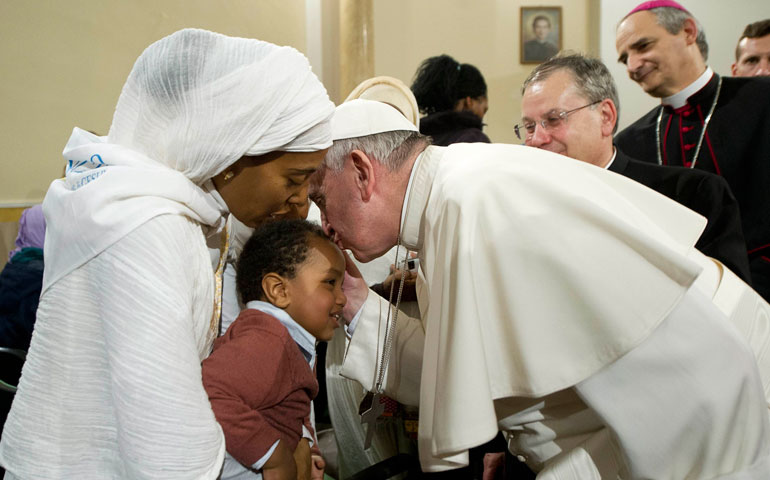
Pope Francis kisses a child during a pastoral visit to the Basilica of the Sacred Heart of Jesus in Rome Jan. 19. (CNS/Reuters/L'Osservatore Romano)
In ways both substantive and symbolic, the "Francis revolution" rolled on in January with personnel shuffles, policy signals and gestures intended to reinforce the pope's vision of a more merciful church devoted to the world's peripheries.
----------------------------------------------------------------------------------------------------------------------------
Breaking News Thursday morning: Francis taps reformer for financial clean-up
----------------------------------------------------------------------------------------------------------------------------
One eyebrow-raising move came Jan. 15, when Francis announced an overhaul of the council of cardinals responsible for supervising the Institute for the Works of Religion, better known as the Vatican bank.
The bank has long been a magnet for scandal. Francis removed all but one of the five cardinals appointed to govern the bank by Pope Benedict XVI shortly after his resignation announcement in February 2013.
Most notably, Francis ousted Italian Cardinal Tarcisio Bertone, the former secretary of state, whose perceived inability to manage the inner workings of the Vatican helped fuel an anti-establishment mood in last March's papal election.
French Cardinal Jean-Louis Tauran, president of the Pontifical Commission for Inter-religious Dialogue, is to remain on the panel, while the new members are Italian Cardinal-designate Pietro Parolin, who replaced Bertone as secretary of state; Cardinal Christoph Schönborn of Vienna; Cardinal Thomas Collins of Toronto; and Spanish Cardinal Santos Abril y Castilló, archpriest of the Basilica of St. Mary Major. All five are perceived to have Francis' trust, and both Schönborn and Collins have a record of calling for reform in bank operations.
While the overhaul represents a break with the past, sometimes change is measured as much by what doesn't happen as what does. Two bits of Vatican silence in January seemed to illustrate the point.
As a sensational criminal investigation of a financier with links to the country's intelligence services unfolded in Italy, Vatican officials held their fire despite charges of corruption within the Camillian religious order and allegations that financier Paolo Oliverio cultivated questionable relationships with various Vatican departments and cardinals.
Officials also kept mum on a case involving Msgr. Nunzio Scarano, a former Vatican accountant dubbed "Monsignor 500 Euro" for flashing large bank notes, who faced new criminal charges Jan. 21 related to money-laundering. He was originally arrested last June for alleged involvement in a scheme to smuggle $30 million in cash on behalf of a family of shipping magnates.
Not long ago, officials might have asserted sovereignty or complained of media and judicial persecution. This time, virtually the only comment came from a Vatican bank spokesman to NCR saying that Scarano's accounts were frozen in July when the Vatican launched its own criminal inquest.
January also brought signals that policy shifts may be in the offing.
Speaking to the Italian Catholic journal Jesus, Bishop Marcello Semeraro confirmed that Francis wants to recognize greater powers for bishops' conferences, including "authentic doctrinal authority." That possibility was first raised in Francis' November document Evangelii Gaudium.
Semeraro, bishop of the Italian diocese of Albano, was named by Francis as the secretary of his Council of Cardinals in April. Semeraro also dismissed criticism of the decision to circulate a public questionnaire ahead of October's Synod of Bishops on the family.
"The beauty of this moment is that the church feels encouraged to ask questions," he said. "The church doesn't just have answers; it also needs to ask questions."
Francis sent a signal of sensitivity to Jewish concerns ahead of his May trip to the Holy Land by telling Rabbi Abraham Skorka of Argentina, an old friend with whom the future pope collaborated on a 2010 book, that he's willing to delay sainthood for Pope Pius XII until Vatican archives from the World War II era are completely open.
The pope moved to heal wounds inside the church by sitting down Jan. 18 with 101-year-old Arturo Paoli, a member of the "Little Brothers of the Gospel" order. Paoli spent 45 years in Latin America and was one of the forerunners of liberation theology, long viewed with ambivalence in Rome.
Francis also continued to engage major world concerns, convening a Jan. 13 summit on Syria that broke with U.S. policy by calling for the inclusion of Iran in the Jan. 22 "Geneva II" summit. The pope's cachet has bred an expanding list of world leaders beating a path to his door, including President François Hollande of France Jan. 24, and the White House has announced that U.S. President Barack Obama will arrive March 27.
Two other gestures seemed calculated to underscore a message of mercy.
On Jan. 12, Francis baptized 32 children in the Sistine Chapel, including a girl whose parents are married civilly but not in the church. It was apparently the first time a child from an "irregular" marriage was baptized in a public papal Mass.
A week later, Francis visited Rome's Basilica of the Sacred Heart of Jesus, described by its pastor as "a periphery in the center."
Located near Rome's main train station, the parish has a large homeless and migrant population. Among the guests of honor at Mass was an elderly homeless woman, who was allowed to bring a shopping cart with her few possessions into the church.
Finally, there was an indication that Francis' concern for the poor is filtering down to the next generation of clergy.
On Jan. 10, students at the Pontifical Urbaniana University, which draws seminarians from the developing world, organized a funeral for a 63-year-old homeless man who had died of cold in the area around the Vatican. It was celebrated by Polish Archbishop Konrad Krajewski, who's responsible for the pope's personal charitable initiatives and who's become a Roman celebrity.
"I'm a bishop of the streets," Krajewski said. "It's normal that I would do this."
The fact that "bishops of the streets" have risen to such renown is, arguably, yet another echo of the "Francis effect."




